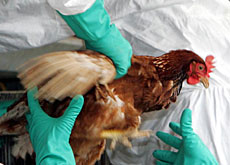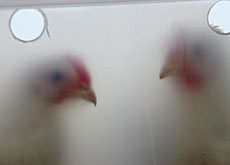Expert sheds light on spread of bird flu

Following the news that bird flu has spread into Russia, swissinfo spoke to expert Christian Leumann about the virus and its consequences for humans.
Swiss officials announced last week that they had started an avian flu information campaign for poultry farmers.
The first Russian cases of bird flu were detected in a Western Siberian region in July, having seemingly spread from southeast Asia where more than 50 people have died from the virus.
On Thursday the Federal Veterinary Office confirmed it had started an information campaign to raise awareness about the virus among poultry farmers. It extended the ban on birds and poultry from Asian countries to Russia and Kazakhstan earlier this month.
The Federal Health Office has also announced that it is to build a reserve of vaccine to protect up to 100,000 people against the avian virus.
The bird flu virus is known to be particularly aggressive and can be transmitted to humans. It is said to be fatal in 50 per cent of cases, compared with just one per cent for normal strains of flu.
Leumann, a professor of bioorganic chemistry at Bern University, explained how the virus is transmitted between species and what can be done to contain it.
swissinfo: Why is it that many flu viruses originate in southeast Asia?
Christian Leumann: Flu viruses spread and mutate particularly fast in regions where birds, people and other animals live together in a small, agricultural areas which are not subject to the best hygienic conditions. This is the case in southern China for example.
swissinfo: The flu virus is in constant mutation. How come the virus, which is normally transmitted between animals, is now being found in humans?
C.L.: This is nothing new – viruses have always done this. The transmission of the flu virus between different species has been particularly well researched.
Flu viruses develop and change through mutations and individual forms of these viruses can suddenly jump between species. In the bird flu case only the virus H5N1 affects humans as well as birds.
swissinfo: What happens then?
C.L.: These originally animal viruses can change more quickly through the genetic exchange with human flu viruses. This leads to new forms of viruses, which are harder for the body’s immune system to manage.
swissinfo: There has been a lot of talk the drug Tamiflu. How well can it fight bird flu?
C.L.: Tamiflu at the moment stops viral reproduction. There are not yet any resistance problems. Viruses change quickly and often become resistant to medications. It’s the same as with antibiotics.
If a medication is taken as a precautionary measure, or much worse, put into poultry feed, the virus will certainly become more resistant more quickly. Such behaviour is irresponsible and does not conform to international standards.
swissinfo: Is this the reason Tamiflu is only available on prescription?
C.L.: This could be one of the reasons. In any case this is a prime example of the necessity of being careful with one of the few medications that works against the virus.
swissinfo: Is this careful approach particularly important at the moment given that there aren’t any vaccines that work yet?
C.L.: Yes because the current viruses are considered to be particularly virulent. For birds they mean almost certain death.
Finding a vaccine against these new viruses still needs time – six months or longer. This reminds me of what happed around the Severe Acute Respiratory Syndrome (Sars) scare, where a vaccine was also needed.
swissinfo-interview: Alexander Künzle
In 1997 a new form of avian flu was discovered in Hong Kong.
The virus, called H5N1, also infected humans.
In 2003 there was a second epidemic.
This type of bird flu has killed thousands of birds in southeast Asia. 57 of the 112 people affected by the virus have died.
13 countries have so far been affected.
The virus recently reached central Asia.

In compliance with the JTI standards
More: SWI swissinfo.ch certified by the Journalism Trust Initiative


You can find an overview of ongoing debates with our journalists here. Please join us!
If you want to start a conversation about a topic raised in this article or want to report factual errors, email us at english@swissinfo.ch.